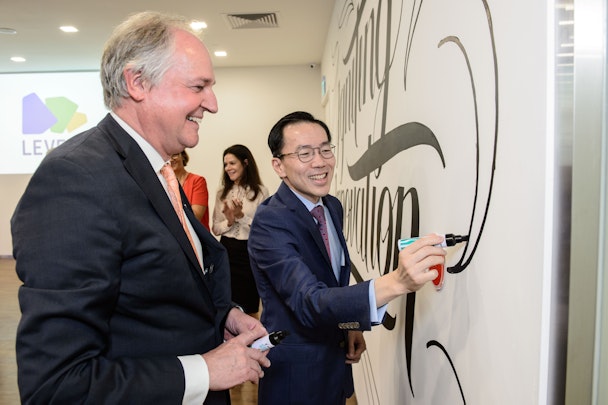Unilever CEO Paul Polman: 'Driving our relevance and innovation higher is the most important thing we do'
Unilever chief executive Paul Polman today (14 February) launched the company’s first ever co-working space in Singapore, Level3. Speaking at the launch event, he said that the city’s proximity to the majority of the world’s population, alongside Singapore’s ambitions as a digital hub, tallied with the FMCG giant’s priorities.

Unilever CEO Paul Polman discussed the reasons behind its Level3 co-working space launch
“Companies like ours, traditional companies, have to continually reinvent ourselves. We would get away with making changes over a five or 10 year period but if you don’t implement them now within a six or 12 month period, you are probably toast. Continually looking how we drive our relevance and innovation capabilities higher is the most important thing we do,” he said.
He explained that new models, such as an FMCG company running a co-working space, were necessary because the speed of change meant it was imperative to stay on ahead of change.
Speed of change is confusing companies
“The speed of innovation, the speed of change that we have in the world, has never been faster and it’s probably confusing a lot of us. It is confusing a lot of companies, it’s confusing a lot of individuals, it drives some of the decisions we see on the political front and, for us, it’s very important as a company that we stay ahead of that,” he added.
The launch is a partnership between innovation incubator Padang&Co and the Unilever Foundry and has been unveiled alongside Singapore’s Economic Development Board.
Polman explained that Unilever had a longstanding relationship with Singapore, which acts as its regional hub for Asia Pacific, but that its importance to the business was evolving from regional to global.
The first reason for this was Singapore’s geographical position between markets that have some of the biggest populations in the globe and Polman (partially) joked that the map of the world should be reorganised accordingly.
Singapore's access to 4.2 billion people
“If you look at the catchment area here, which I would define as a six hour flight or less, we are really talking about 4.2 billion consumers around the world. I am always surprised when you look at a world map that has my home country of The Netherlands in the center of it and I wonder why that’s how we look at the world. I don’t know if it has any correlation with me being born there, but when you look at where the world is and where the population is, you really should create another map of the world. Having 4.2.bn people in such a small catchment area makes it exciting,” Polman said.
Singapore’s investment into smart technology as a nation was the second reason he gave, alluding to the country’s Smart Nation mandate, which includes a plan to create an operating system for 100 million smart objects. The Singapore Economic Development Board alone has pushed the marketing industry’s move to digital and data, helping with education and R&D schemes at major media businesses.
China's ecommerce growth is on steroids
“In 2016, nearly in anticipation of the launch, we made significant investments again in Singapore in the areas of analytics, digital and ecommerce, which is very fast growing,” he explained. “China, for example of growth in the region, is on steroids as far as ecommerce is concerned.”
He said that Unilever was already carrying out pilots in the region around AI, cognitive computing, social analysis and smart data.
“It builds on what Singapore is creating around a smart nation and the digital hub that I think we will benefit from enormously,” he continued. “Singapore certainly ranks among the best city for startups in Asia and I think it will soon rank as one of the best cities for startups globally.”
Level3 launched with 15 startups today but will eventually house almost 50, using the Unilever Foundry model of setting live briefs to startups to help find solutions to brand problems.

